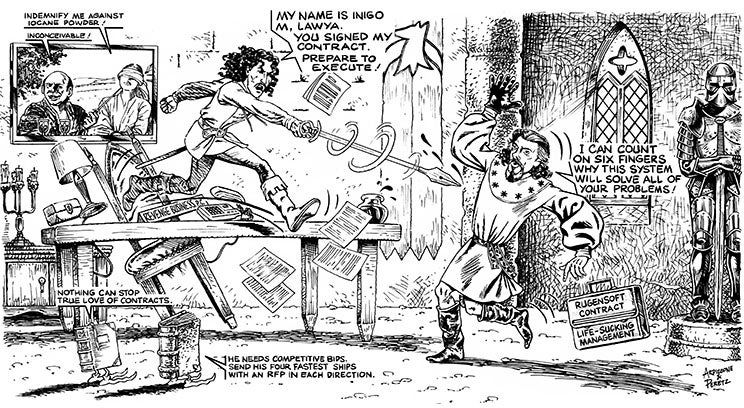
While tales of pirates, princesses, swordsmen, and giants are pure escapism for most people, they can provide inconceivable guidance to inhouse counsel about conquering the sometimes slightly more mundane tasks of running their own kingdom. The next time one of your company's competitors is trying to kidnap what your colleagues have rightfully stolen, heed some of the important lessons from Rob Reiner’s film adaptation of S. Morgenstern's Classic Tale of True Love and High Adventure, The Princess Bride.
“Truly, you have a dizzying intellect.”
Most lawyers possess an extensive vocabulary and are ready to show off their erudition about the fourth and fifth dictionary definition of an otherwise commonly understood term. While these witty insights may provide minor amusement in court briefs, as an operational GC, you need to hold these tendencies in check because they can lead important conversations down hair-splitting, amusing, but useless paths.
Rather than distract the conversation, you should deploy your superior knowledge of vernacular to pursue the truth. You already assiduously push opposing counsel to nail down the specific risks and commitments in your external contractual relationships. Now it’s time to do the same when someone is trying to sell you technology.
“We are men of action. Lies do not become us.”
The rise of electronic signatures, combined with the relentless drive of sales teams to close deals, has led to optimizations of document routing for signatures by your own team and that of your counterparties. Everyone wants to get the deal closed before the quarter ends, the covenants are blown, or the (next) shelter-in-place order goes into effect.
What happens once the agreement is signed? Your colleagues (and your e-signature vendor) crow that the agreement is “Executed!” And now it’s time to work on the next deal!
Time to blow the whistle and break out the dictionary, opened to the letter E... What does it mean for an agreement to be “executed”? It means to carry an agreement into operation and fulfill performance requirements.
The truth is, signing your agreement is just the beginning of all the steps necessary to truly execute on each party’s obligations and rights. An operationally-minded GC knows that signing the contract is just the first of many steps to extracting the value out of it.
Your operations team may have just committed to a new service level they need to be briefed about. Your sales engineers may need to perform customer training at new intervals. And your procurement team may need to monitor whether you are hitting the volume commitments to justify the great price you negotiated. True “execution” of the agreement involves all of these steps — not just signing the paper and riding off into the sunset.
Thus, the next time someone tells you a contract has been executed and is complete, utilize that big vocabulary and intellect of yours to ask what they mean by “execution.” Do they really mean to say that the agreement is merely “signed” and now it is time for the performance to get the value out of it? Misusing the word “execution” is an invitation to underestimating the amount of work you and your organization still have ahead of you.
“Life is pain, Highness. Anyone who tells you differently is selling something.”
Enter from stage left, the literal deux ex machina: the so-called “Contract Lifecycle Management” (CLM) system software. What do these software providers mean by the word: “Lifecycle”?
Certainly we don’t consider a child’s lifecycle to end directly after birth and delivery to the nursery. However, that is essentially the definition of “lifecycle” implied by most contract “lifecycle” management vendors. The bulk of their systems focus on creating and routing around templates and arranging for their electronic signature. For all the agreements that have already been signed, they are consigned to the equivalent of a nursery for documents: an empty database for storage and a blank slate for note-taking.
A contract is the embodiment of ground rules for a relationship between two or more parties. The “lifecycle” of a contract begins when those parties agree to it and ends when the agreement no longer binds and guides the relationship between the parties.
In real life, lifecycle management means understanding and carrying out all the terms of my organization’s contractual relationships and obligations until you are no longer required to do so.
Is that the focus of “Contract Lifecycle Management Systems”? No. Instead they focus on helping you write and sign new agreements more quickly. Essentially, they get you to the stage where a contract is born. After that, the systems serve as a storage repository, unless you read all the agreements yourself, find the key clauses, and develop your own workflows to carry them out.
When you ask vendors how they can call their system a “Lifecycle Manager,” many will explain that is the classic definition for their category.
You have to admire a guy who called his system a classic before anyone else had a chance to use it.
The next time someone offers you a contract “lifecycle” management system, ask how it goes about interpreting and carrying out all your existing agreements that have already been signed. In other words, how does their definition of “lifecycle” extend past the birth of the agreement? It’s a lot easier to promise a full solution than to deliver one.
Ask to put their system through its paces for a disparate group of your existing agreements. Can they deliver on the operational definition of “execution” and “lifecycle.” Or do they believe their marketing promises are all that is necessary to make it so?
If it turns out that you still need to hire a bunch of attorneys to read your agreements or error-check their system’s handling of all your existing agreements, you are not being presented with a true “lifecycle” management tool. Reading and interpreting agreements, let alone executing on them, requires work and effort. Thus, qualified attorneys are a sine qua non of any true solution. Without attorneys doing the hard work, the promise of a “lifecycle management” system is just a bill of fictitious goods.
“Once word leaks out that a pirate has gone soft, people begin to disobey you, and then it's nothing but work, work, work, all the time.”
As an operational attorney, you have the unique perspective of being able to see how many contracts your organization already has in place, and what are all the steps required to execute on them throughout their real lifecycle (i.e., when no further obligations or rights survive). You need to measure your systems providers against all of these steps. Any step of the real contract lifecycle they don’t cover, particularly for all your existing agreements, will be work, work, work for you all the time.
Why focus on existing agreements? Because those typically outnumber the new agreements in any given year by one hundred-to-one. It is all these existing agreements driving your organization’s current revenue and expenditures. Go where the bulk of your organization’s work is when evaluating vendors.
If you let a vendor misdefine words like “lifecycle,” you are leaving all the hard work for your own organization. Likewise, if you don’t focus them on the lion’s share of your agreements, which are those already in force, you are letting them pretend that their niche is the entire universe. Again, the result is more work for you and your colleagues to fill the vendor’s gaps.
“Have fun storming the castle!”
Yes, there is a massive edifice of deliberately misnamed products out there related to contracts. Every time you call a vendor’s bluff on the meaning of terms like “execution” and “lifecycle,” you are not just gathering clarity about the possibility of whether they can satisfy your organization’s most important requirements, you are also fostering a culture of more honest communication in the entire industry.
As a lawyer, you are uniquely empowered to lead the charge for more precise product descriptions and wording from vendors, particularly those selling to your department. It’s time to use your legal skills and knowledge of your organization’s end-to-end needs to strike a blow for accuracy and truthfulness in advertising. While it might seem inconceivable, you have the power.




